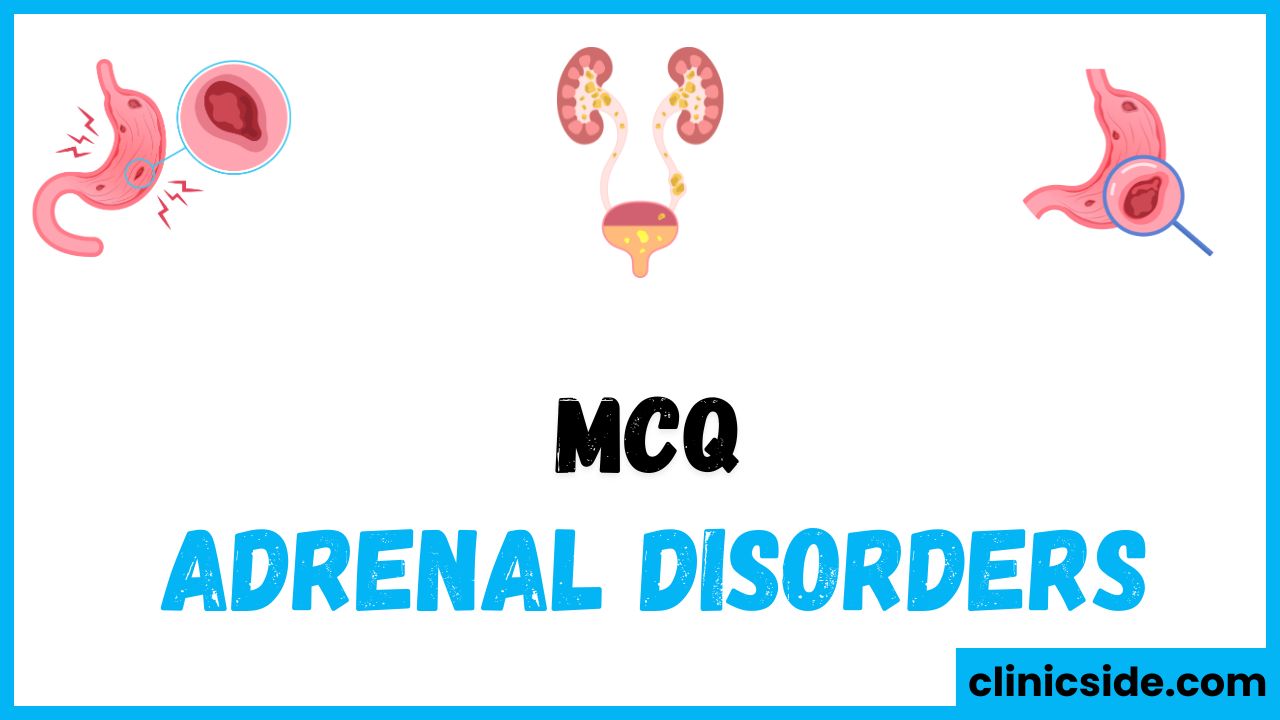Quiz
Available options: 1 to 20
Summary of the MCQs on Adrenal Disorder
Contraindications for Thyroid Treatments
Radioactive iodine therapy is not recommended during pregnancy due to the risk it may pose to the developing fetus. Propylthiouracil, a short-acting drug for hyperthyroidism, is especially useful in pregnancy. Methimazole is commonly used for hyperthyroidism treatment, while Levothyroxine is the treatment of choice for hypothyroidism. Overuse of iodine can result in iodine-induced hyperthyroidism, underscoring the need for cautious dosing.
Adverse Effects of Antithyroid Medications
Medications like methimazole and propylthiouracil are commonly prescribed for hyperthyroidism but may lead to serious side effects, including agranulocytosis, which involves a dangerous drop in white blood cells. Perchlorate works by inhibiting iodine uptake in the thyroid, thus preventing thyroid hormone synthesis.
Hypothyroidism Treatment Protocol
For chronic hypothyroidism management, Levothyroxine is the most widely prescribed medication, providing a synthetic version of the T4 hormone. Potassium iodide is often given before surgery to minimize thyroid vascularity. However, breastfeeding mothers should avoid radioactive iodine as it can pass into breast milk, potentially harming the infant.
Management of Addison’s Disease
Fludrocortisone is the main treatment for Addison’s disease, a condition in which the adrenal glands do not produce sufficient hormones, particularly cortisol and aldosterone. In cases of congenital adrenal hyperplasia (CAH), Hydrocortisone is administered to correct cortisol deficiencies caused by genetic mutations.
Managing Cushing’s Syndrome
Ketoconazole is used to manage Cushing’s syndrome by inhibiting adrenal steroid production, effectively reducing excessive cortisol levels. For patients unable to undergo surgery, Pasireotide, a drug that suppresses ACTH secretion, can help control cortisol overproduction in Cushing’s disease.
Side Effects of Long-Term Corticosteroid Use
Long-term use of corticosteroids like dexamethasone and hydrocortisone can lead to several adverse effects, with osteoporosis being the most concerning. These medications can interfere with calcium metabolism, increasing the risk of bone fragility. Other side effects include weight gain, glucose intolerance, and an increased risk of infections.
Mineralocorticoid Receptor Antagonists
Spironolactone is a mineralocorticoid receptor antagonist commonly used to treat primary aldosteronism, a condition where excessive aldosterone secretion leads to high blood pressure and fluid retention. Mifepristone, which blocks glucocorticoid receptors, is used in the management of adrenal disorders like Cushing’s syndrome.
Thyroid and Adrenal Hormone Replacement Therapy
For managing thyroid conditions, Levothyroxine is the go-to treatment for hypothyroidism, whereas methimazole and propylthiouracil are effective for hyperthyroidism. Fludrocortisone is used in adrenal insufficiency, while spironolactone helps regulate aldosterone levels in conditions such as primary aldosteronism.
Primary Treatments for Hyperthyroidism
The main treatments for hyperthyroidism are methimazole and propylthiouracil, which help reduce thyroid hormone production. Levothyroxine is not used for hyperthyroidism, as it is designed for treating hypothyroidism. Radioactive iodine is an effective long-term solution for hyperthyroidism but requires careful monitoring to avoid complications such as iodine-induced hyperthyroidism.
Special Considerations for Endocrine Treatments
Certain treatments must be chosen with caution, especially in specific patient groups like pregnant or breastfeeding women. For example, radioactive iodine should be avoided during pregnancy or while breastfeeding due to its potential harmful effects on the baby. Propylthiouracil is preferred for treating hyperthyroidism during pregnancy, while Levothyroxine is safe for long-term hypothyroidism management. Additionally, adrenal treatments such as fludrocortisone and hydrocortisone require careful monitoring to minimize the risk of side effects like osteoporosis.
Conclusion
The medications used to treat thyroid and adrenal disorders must be carefully selected based on the patient’s condition and individual needs. While Levothyroxine and methimazole are essential for managing thyroid issues, fludrocortisone and spironolactone play key roles in treating adrenal conditions. Awareness of potential side effects, including osteoporosis and agranulocytosis, is crucial to providing effective and safe therapy for patients with these endocrine disorders.





